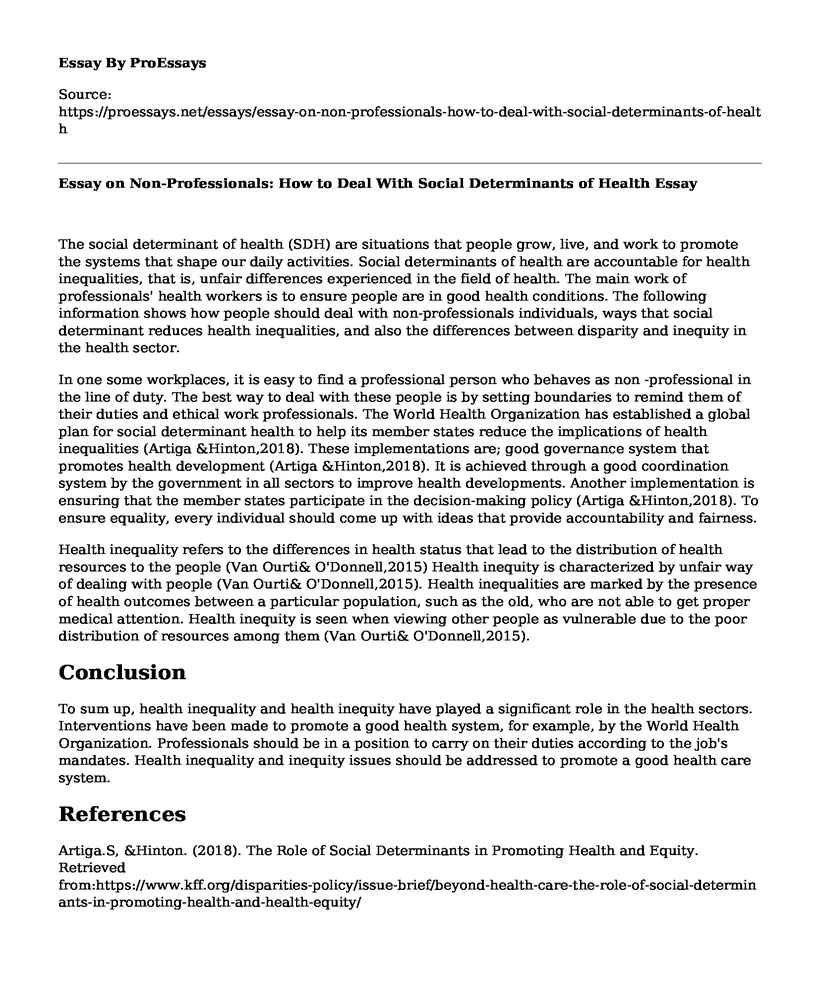The social determinant of health (SDH) are situations that people grow, live, and work to promote the systems that shape our daily activities. Social determinants of health are accountable for health inequalities, that is, unfair differences experienced in the field of health. The main work of professionals' health workers is to ensure people are in good health conditions. The following information shows how people should deal with non-professionals individuals, ways that social determinant reduces health inequalities, and also the differences between disparity and inequity in the health sector.
In one some workplaces, it is easy to find a professional person who behaves as non -professional in the line of duty. The best way to deal with these people is by setting boundaries to remind them of their duties and ethical work professionals. The World Health Organization has established a global plan for social determinant health to help its member states reduce the implications of health inequalities (Artiga &Hinton,2018). These implementations are; good governance system that promotes health development (Artiga &Hinton,2018). It is achieved through a good coordination system by the government in all sectors to improve health developments. Another implementation is ensuring that the member states participate in the decision-making policy (Artiga &Hinton,2018). To ensure equality, every individual should come up with ideas that provide accountability and fairness.
Health inequality refers to the differences in health status that lead to the distribution of health resources to the people (Van Ourti& O'Donnell,2015) Health inequity is characterized by unfair way of dealing with people (Van Ourti& O'Donnell,2015). Health inequalities are marked by the presence of health outcomes between a particular population, such as the old, who are not able to get proper medical attention. Health inequity is seen when viewing other people as vulnerable due to the poor distribution of resources among them (Van Ourti& O'Donnell,2015).
Conclusion
To sum up, health inequality and health inequity have played a significant role in the health sectors. Interventions have been made to promote a good health system, for example, by the World Health Organization. Professionals should be in a position to carry on their duties according to the job's mandates. Health inequality and inequity issues should be addressed to promote a good health care system.
References
Artiga.S, &Hinton. (2018). The Role of Social Determinants in Promoting Health and Equity. Retrieved from:https://www.kff.org/disparities-policy/issue-brief/beyond-health-care-the-role-of-social-determinants-in-promoting-health-and-health-equity/
VAN OURTI, T. O. M., & O'DONNELL, O. W. E. N. (2015). INEQUALITIES IN HEALTH AND HEALTH CARE. Erasmus, 6, 10. Retrieved from: https://www.kff.org/disparities-policy/issue-brief/beyond-health-care-the-role-of-social-determinants-in-promoting-health-and-health-equity/
Cite this page
Essay on Non-Professionals: How to Deal With Social Determinants of Health. (2023, Apr 09). Retrieved from https://proessays.net/essays/essay-on-non-professionals-how-to-deal-with-social-determinants-of-health
If you are the original author of this essay and no longer wish to have it published on the ProEssays website, please click below to request its removal:
- Nursing Professional Responsibility to Deal With an Aging Population Essay
- Research Paper on Social Work
- Concept Analysis of Pain - Research Paper
- Social Contributing Factors of Health Essay Example
- 5 Types of Wounds: Causes & Treatments for Surgical Technologists - Essay sample
- Comprehensive Education Needed for Homeless Diabetics: Diet and Health Benefits - Essay Sample
- Essay Example on Overweight Predisposes Individuals to Cardiovascular Diseases: BMI Vital for Interventions







